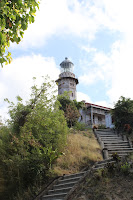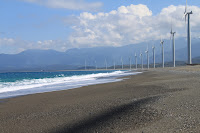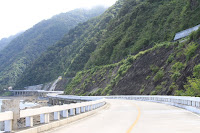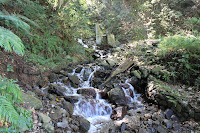Pagudpud is on the northwest part of the Philippines facing the South China Sea and a 12-hour bus ride from Manila. Known for its big waves and strong winds that cater to both local and international surfing and sailboarding communities, this town is lined up with beach resorts that offer ample and relatively affordable accommodations. Peak season is from March to June so we got off peak rates when we visited.
We arrived at Jun and Carol’s beach resort at 5 AM, it was a coin toss between this and Polaris but the latter took much longer to respond to my SMS so I opted for JCBC. We were assigned a room on the second floor. it had air conditioning, two double beds, a cable TV and a huge bathroom that’s like half the size of the room; the rate was $35 for four persons. 
After an hour of trying to sleep, we decided to go out and explore the city. We took the tricycle and checked out the market in the hopes of having a breakfast of local cuisine. Wednesday is market day at this place, we saw live curacha and other sea creatures.
We hired the same trike to take us on a city tour and our first stop was the lighthouse at Cape Bojeador in Burgos. Built in 1892, Faro Cabo is still fully operational and sits on the top of the Vigia de Nagparitan hill, 530 feet off the ground. One of the rooms has been converted into a mini museum which reminded me of the lighthouses that we visited at Oregon coast two years ago. The caretaker was kind enough to unlock the bolted gates of the lighthouse so we could go up the rust covered steel stairs to the creeky wooden platform where the light and mirrors sit. The top offered a 360 degree view of Ilocos Norte and the surrounding sea.
Next stop was the Bangui Wind Farm, a lineup of 15 wind mills facing the sea that supplies the town’s electricity. The view here was spectacular, we walked on the fine sand and met the waves crushing the shore as we took photos of the area. We also bought Bugnay wine from a local seller by the beach, a present for our grandma in Romblon.
We proceeded to the Patapat Viaduct, Agua Grande River Park and Paraiso ni Anton, which were all just a few meters away from each other. The road going there was lonely and winding, not a lot of vehicles pass by and if they do, they’re like a scene from fast and the furious, everyone ignoring the speed limit.
Constructed to prevent landslides in the area, Patapat Viaduct is an elevated highway with one side overlooking the Pasaleng Bay and the other guarding tall rocky mountains. We sat on the middle of the road and took pictures here.
Owned by Villa Del Mar, Agua Grande is a brook that runs over pebbles and stones to meet the sea and gray sandy beach. right on the front of this park, there is a grotto facing the street. The El Nino was taking its toll on this part of town when we were there, we were surprised to see the river almost dried up. 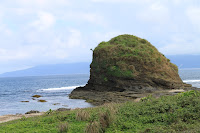
We then proceeded to Sitio Gaoa in Balaoi for the Timmangtang Rock and the Bantay Abot Cave, the two are collectively called Lover’s Rock by locals.
 Timmangtang lies on the seacoast and got its name from its bell-shaped form while Bantay Abot is a few meters away from the shore and literally means a mountain with a hole in the dialect. To get to the cave, we had to go down the side of the street and climb up the slippery rocks to the summit. We went spelunking and took photos from the other side.
Timmangtang lies on the seacoast and got its name from its bell-shaped form while Bantay Abot is a few meters away from the shore and literally means a mountain with a hole in the dialect. To get to the cave, we had to go down the side of the street and climb up the slippery rocks to the summit. We went spelunking and took photos from the other side.
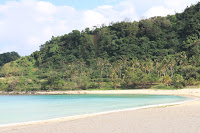
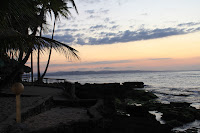 The last stop for the day was the crescent shaped cove at Sitio Malingay on the Maira-ira Point, it is more commonly known as the Blue Lagoon. This beach is around three kilometers away from the main road and one has to go through mountain forest paths to get there. It was near Hannah’s Beach Resort and Kapuluan, two of the more expensive places to stay in this town. Tired from our hikes and rough road trike ride, we sat on the shore and buried our feet on the sand. The clear blue water and white sands of this place has convinced me that it is the highlight of our trip. Next time I just might try those two resorts so I could be nearer to this part of Pagudpud.
The last stop for the day was the crescent shaped cove at Sitio Malingay on the Maira-ira Point, it is more commonly known as the Blue Lagoon. This beach is around three kilometers away from the main road and one has to go through mountain forest paths to get there. It was near Hannah’s Beach Resort and Kapuluan, two of the more expensive places to stay in this town. Tired from our hikes and rough road trike ride, we sat on the shore and buried our feet on the sand. The clear blue water and white sands of this place has convinced me that it is the highlight of our trip. Next time I just might try those two resorts so I could be nearer to this part of Pagudpud.
We ended the day with a hearty meal at one of the roadside carinderia and tried the local cuisine that included pinakbet and imbalictad. After dinner, we retired back to our resort to catch the sunset and walk along the beach.
 The next morning, we took the same trike and went to Kabigan Falls. I didn’t know that we had to cross rice fields and walk across rivers to get to the falls so I wore sneakers. Good thing the store near the place where we had to register our names and give donation to had flip flops for sale. We got a tour guide who led us through the thicket of trees and shrubs.
The next morning, we took the same trike and went to Kabigan Falls. I didn’t know that we had to cross rice fields and walk across rivers to get to the falls so I wore sneakers. Good thing the store near the place where we had to register our names and give donation to had flip flops for sale. We got a tour guide who led us through the thicket of trees and shrubs. 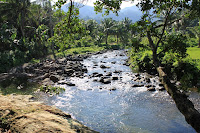
After coaxing a water buffalo to get out the way, we navigated the first stream, which was rather narrow. The next one had slippery rocks and strong currents, while the third one destroyed my brother’s slippers. Finally, we got to the foot of the falls and took some pictures. It was rather disappointing compared to Kawasan, still one of my favorites, but is comparable to Oregon’s Multnomah. The hike back seemed shorter and we treated ourselves to a refreshing drink – juice from freshly picked coconuts.
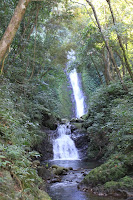 We were debating if we should stay another night at Pagudpud and spend a day swimming but we still had lots of beaches to go to in the next couple of days so we decided to head to the next destination and take the bus to Vigan.
We were debating if we should stay another night at Pagudpud and spend a day swimming but we still had lots of beaches to go to in the next couple of days so we decided to head to the next destination and take the bus to Vigan.
Five years ago, my friends went on a Pagudpud-Vigan trip that I couldn’t join because of other responsibilities, they brought me back souvenirs and lots of stories. Today I went to see the place for myself and am happy that despite everything in the background, I’m finally able to enjoy the scenery of my country.
